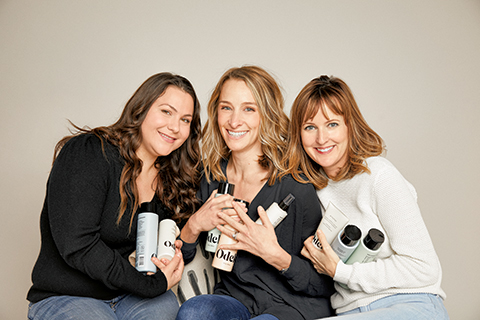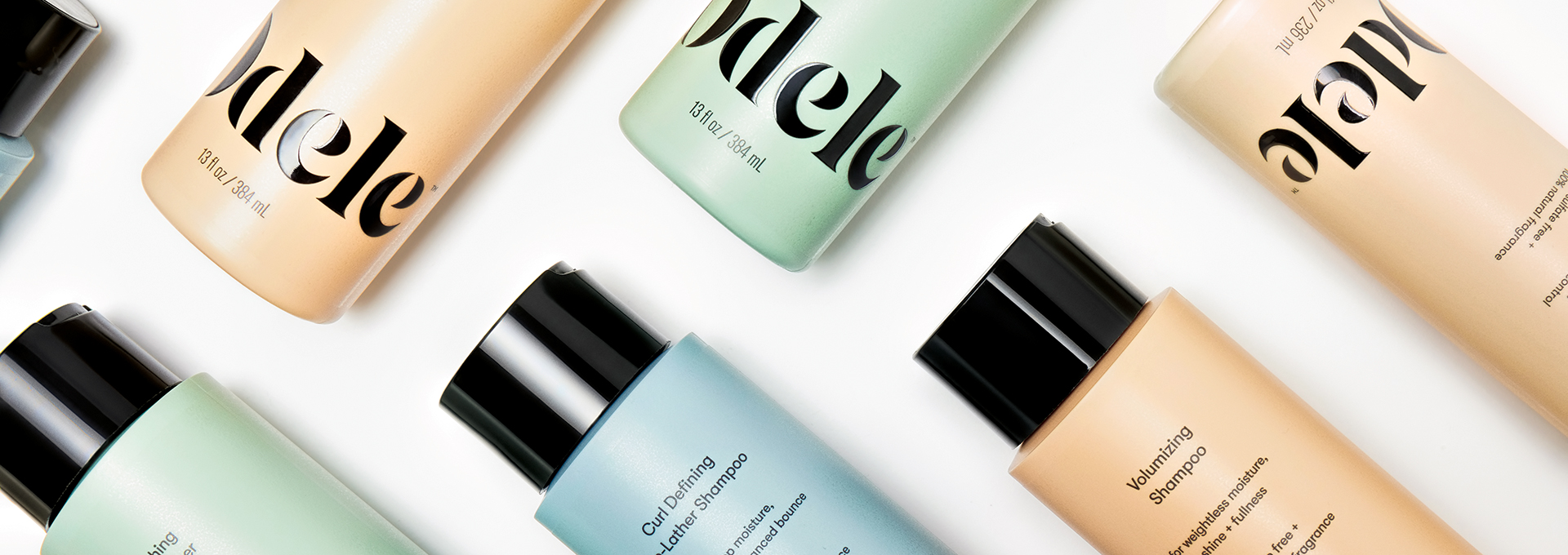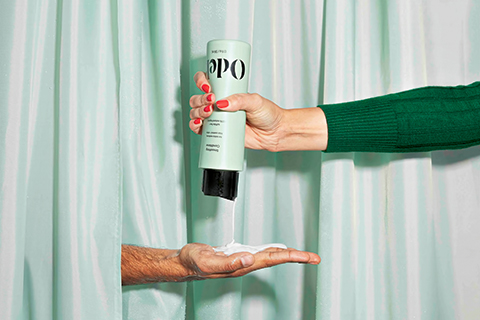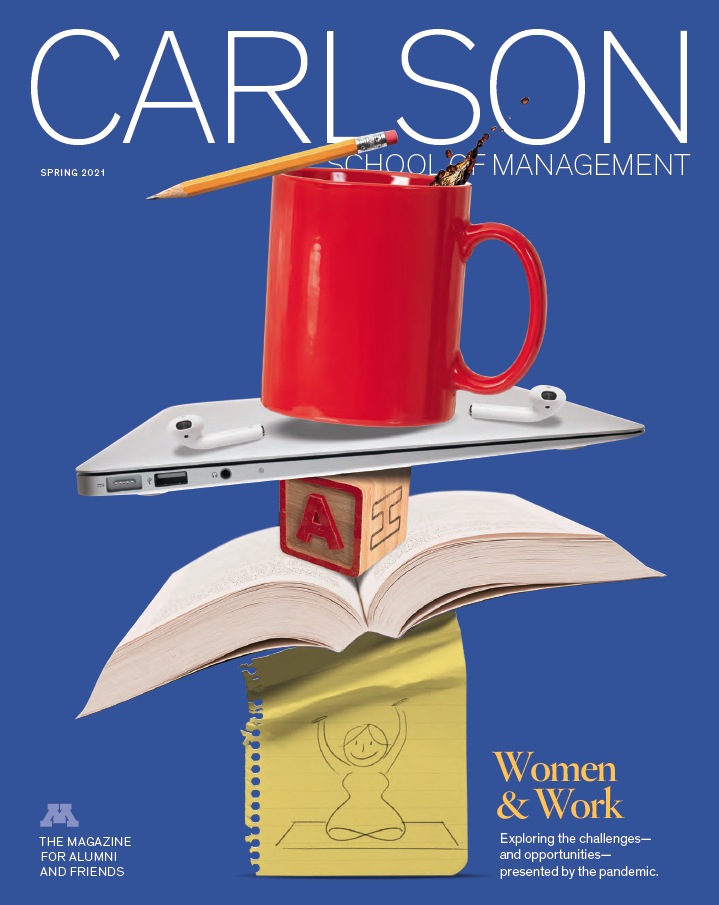
Making Waves
Thursday, April 1, 2021
BY BRIDGET BURNHAM
Female founders build startups with a style all their own.
Startup culture seems to be encoded into some people’s DNA. So when Britta Chatterjee (’03 BSB, ’10 MBA) and Lindsay Holden (’10 MBA) met as students in the Carlson School’s Brand Enterprise, they immediately hit it off, bonding over dreams of starting a company together. And like all true entrepreneurs, they continued to feel the tug toward owning their dream even while building successful careers at large corporations. Chatterjee eventually moved into the haircare and beauty industry, where she met the third corner of the of Odele triangle: Shannon Kearney. In 2019, the three women launched Odele Beauty, a line of clean, affordable, ungendered hair care products designed to be shared with everyone in a household. Their years of building their skills and knowledge were rewarded: Odele can now be found in Target stores nationwide.
Flexibility, Family, and the Future
Chatterjee, Holden, and Kearney started Odele because they wanted to build something that would meet their professional goals, personal needs, and the needs of their growing families. Though their reasons varied among them, the ultimate solution seemed to be doing their own thing, their own way.
Holden says she was never motivated by the linear corporate path and left her traditional 9-to-5 role because she wanted more time with her family.
“Reporting to ourselves gives us more flexibility,” says Holden. “Whether it’s working at night or over naptime, we can build our day to protect what is important.”
When Chatterjee started her career, she was dedicated to climbing the corporate ladder, but the birth of her first child shifted her focus to the entrepreneurial world.
“There can be events in a woman’s life that change her trajectory, but not a lot of people talk about it,” Chatterjee says. “You’re just supposed to say you’re fine. But for me, becoming a mom meant reevaluating my path.”
Kearney, who entered the workforce at age 19 and became a single working mom at 21, loved her job and had a hard time saying goodbye when the company she was working for was acquired.
“It was a harsh realization to know that after putting so much of myself into the company, I would ultimately have no say in what would happen,” Kearney says.
But Kearney was determined not to let the knowledge and skills she built—not to mention the passion she had—go unrealized. When the opportunity arose to start a company with the other two women, she jumped in and hasn’t looked back.
The increasing success of female- founded companies, such as Odele, points to a narrowing gender gap in entrepreneurship. Mary Benner, department chair and professor in the Strategic Management and Entrepreneurship Department at the Carlson School, has seen a lot of progress since she left the corporate workforce in the ’90s, but says there is still a long way to go.
“Women have more opportunities to take on leadership roles,” says Benner. “But they still face ingrained sexism and bias. Unintended, unconscious biases become an oppressive burden when they aren’t recognized and addressed.”
Benner believes diversity, equity, and inclusion in the classroom can make a difference. She seeks out case studies and examples of female CEOs and leaders with diverse backgrounds to share with her classes and strives to create an environment where everyone can participate.
But how does that inclusivity extend beyond the academic setting and into the startup world? Sandy Yu, assistant professor in the Strategic Management and Entrepreneurship Department at the Carlson School, is researching the impact of different types of financing on the growth and success of startups. She says several factors come together to create a robust entrepreneurship ecosystem, but human capital and available funding are the two major components.
“Our approaches to finding prospective founders and making funding available to them affect the gender gap,” says Yu. “By increasing representation at the early stages of the cycle, we can continue to close the gap at every step.”
There can be events in a woman’s life that change her trajectory, but not a lot of people talk about it. You’re just supposed to say you’re fine. But for me, becoming a mom meant reevaluating my path.
Finding the Right Funders
Despite extensive haircare and retail experience and a presentation packed with detailed analysis and projections, Chatterjee, Holden, and Kearney say they felt like some investors questioned their certainty in their idea. “It didn’t matter if it was a male or female investor,” says Chatterjee. “Even walking in with a commitment from Target, we were asked to defend our confidence and show our plan for losses. It was subtle, but we had to be aware of the line of questioning and shift the conversation from risk to growth.”
Odele isn’t alone. According to Allison Hubel, professor of mechanical engineering at the University of Minnesota and founder of BlueCube Bio, a startup that creates cryogenic storage for cell therapy companies, the struggle for equal access to resources continues throughout the commercialization process. From filing for a patent to finding lab space, Hubel says people treated her all-woman team differently.
“If it were just one person, that would be one thing,” says Hubel. “But when you see it over and over again, there are some imposed obstacles.”
Bias negatively impacts the amount of funding women-led ventures receive. Female-founded companies raised just $6 billion in 2019, compared to $195 billion raised by male founders. And it’s not just the money: Women entrepreneurs miss out on the mentorship and accelerated growth that often come with access to early-stage funding.
“Success feeds success,” says Yu. “Once female entrepreneurs get their foot in the door and gain connections, they will continue to do well. Female founders that do get funding eventually tend to outperform their male counterparts.”
The Odele and BlueCube teams say the silver lining to the disheartening exchanges helped them steer away from investors and partners who weren’t a good fit and focus on creating the right connections.
Success feeds success. Once female entrepreneurs get their foot in the door and gain connections, they will continue to do well. Female founders that do get funding eventually tend to outperform their male counterparts.
Building a More Powerful Network from the Ground Up
From fellow founders to mentors, investors, and board members, startups need connections in a number of arenas where women are still in the minority. According to Yu, helping female entrepreneurs plug in to the humming ecosystem is essential. “Female founders have different networks than male founders,” Yu says. “Angel investors and venture capital firms tend to rely heavily on referrals.”
Hubel, who says she is naturally introverted but relies on training and mentorship to enhance her communication skills and connections, knows how strong backers can burnish a founder’s reputation and help build a broad and robust network.
“Our network allowed us to find alternative resources when others fell through or didn’t deliver,” she says. “Talking with people lets us see different approaches to commercialization and keeps supporters connected with BlueCube.”
Fresh Definitions of Success
While many founders jump onto a path of growth for growth’s sake, Odele and BlueCube both describe their goals with a dimension that goes beyond increasing revenue. Hubel says the definition of success is any step that helps BlueCube make the most significant impact possible on the world of cell preservation. Kearney sums up Odele’s stance: “We strive to do the best thing in the best way we can. We show up and we don’t take shortcuts.”
It’s not that Odele doesn’t have big growth plans, but rather the team intentionally reins in the pace and narrows their focus in order to protect how they expand. “Financial independence and success are motivators, but one of the reasons we started this company is to be there for our families,” Chatterjee says. “We constantly weigh personal responsibilities into our business decisions.”
The Odele team says that confidence in their value and values makes their disciplined approach work, especially during the turbulence caused by the COVID-19 pandemic. “We’re having a lot of ‘not now, but when’ conversations,” Chatterjee says. “We know our growth won’t be less because we are women. It will just be different. It will always include the holistic health and wellbeing of our team and their families.”
According to Hubel, BlueCube’s growth is guided by science. “We always want to meet the next big societal need,” says Hubel. “We’ll continue our journey of discovery and let the data move us forward. When we find something transformative, we’ll work to prove it and move it into practice.”
Maintaining Momentum
Entrepreneurship is a wild ride, even without the hurdles of gender inequality. On her tough days, Hubel says she relies on helpful advice from a fellow founder. “The CEO of another startup once told me that entrepreneurship is like rock climbing,” says Hubel. “You have to keep moving, or you’re going to fall.”
She says that BlueCube’s consistent steps forward and the help of her network has helped make the business successful, and it’s this combination of collaboration and persistence that is reshaping the entrepreneurial landscape and making it more inclusive.
“Attention on this issue will continue,” says Benner. “It may take some time, but someday it won’t be so novel for a female-founded company to go public or become a unicorn company.”
The Odele team remains focused on taking each step forward with purpose.
“We’re proud of the inclusivity of our brand, how we’re showing up in our communities, and the example we’re setting for our kids,” says Holden. “Every experience so far has led us here. We trust ourselves and our ability to surround ourselves with the right people, test, learn, iterate, and continue to succeed.”
Ascending Together
Rosemary Ugboajah started Neka Creative in 2013 because she wanted to use her passion and expertise to build extraordinary brands. What began as project work for a few corporations evolved into a team of experts helping brands thrive with Inclusivity Marketing. Inclusivity Marketing is Neka Creative’s trademarked holistic approach of bringing different perspectives, histories, experiences, needs, and motivations together in one cohesive brand process.
As Neka Creative grew, Ugboajah felt she could use more business guidance and more connections. “Entrepreneurship can be very lonely,” says Ugboajah. “As you’re learning, you’re also trying to make a living. Building something from nothing can be isolating.”
Ugboajah first turned to the Metropolitan Economic Development Association (MEDA), an organization that provides business development services, access to capital, and corporate and governmental market support for BIPOC businesses with the potential to scale. At the recommendation of her MEDA counselor, Ugboajah joined a cohort of twelve business owners with Ascend Twin Cities. Ascend is a partnership initiative between JPMorgan Chase & Co., MEDA, and the Holmes Center for Entrepreneurship at the Carlson School that provides access to capital, market opportunities, and business education to BIPOC Entrepreneurs.
Ugboajah says the guidance she received through Ascend brought clarity for her business as she zeroed in on her target market and honed her strategy. But even more valuable, says Ugboajah, are the connections she made.
“The network of businesses we formed through Ascend is unique,” says Ugboajah, “We know each other’s aspirations and the barriers we are trying to overcome. We support each other and serve as resources for one another.”
Ugboajah’s positive experience with Ascend led her to expand her network even further.
“I realized I enjoyed being in a community with other business owners, so I joined a cohort of CEOs in my industry. Without my experience with Ascend, I probably wouldn’t have done that.”
“Entrepreneurship can be very lonely. As you’re learning, you’re also trying to make a living. Building something from nothing can be isolating.”
- ROSEMARY UGBOAJAH



